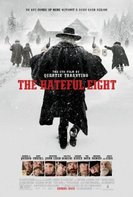
The first half of the film displays Tarantino's skill at bringing out great performances from his directing and writing. All of the characters clearly have some hidden background that are brought to the forefront of the film. As with every Tarantino movie, the audience is forced through a tense buildup until the second half of the film where everything will be revealed. That being said, the first half of the film showed off a brilliant script that was well-crafted by Tarantino himself. Yet, the second half of the film fell short in my opinion with its overly-dramatized violence. Of course violence is a crucial aspect of Tarantino's other films, but this one did not have the plot support to go along with the violence. Rather, the backstory of the characters falls a bit short of what I was expecting and hoping for. Nonetheless, the actors do their part in bringing justice to the screen. Samuel L. Jackson, Kurt Russell, and Tim Roth really shine while acting out a very well-written script.
In the script, race issues are directly tackled in a setting that occurs right after the end of the Civil War. As with Django Unchained, The Hateful Eight tackles slavery and the racial power struggle. Furthermore, Tarantino adds sexism into the mix with Daisy Domergue's character played by Jennifer Jason Leigh. The development of Leigh's character and Jackson's character twists around different power positions for both women and African-Americans in the post-Civil War society. Without any spoilers, you can expect a lot of violence that is used to sort out these social matters.
With this film, I must include the technical aspects which were truly superb. Starting off with the camerawork, Tarantino truly revives the 70mm format with the wide shots at the beginning of the film. The landscape is spectacular and reminiscent of old western films such as Butch Cassidy and the Sundance Kid. I assume that trying to capture a blizzard on camera can be awfully hard, but the screen is often filled with snow and great winds that made me feel happy to be in the theater in the middle of winter. With that being said, all of the camerawork is what should be expected in a Tarantino film. Another great expectation from a Tarantino film is a deep music score. Once again, Ennio Morricone delivers exactly what Tarantino needs for The Hateful Eight. This is a dramatic score that has a very small western aspect to it. More than feeling like a western score, the music feels like a very subtle but hard-hitting score that works perfectly for Quentin.
The Bottom Line: Tarantino delivers another great film that is technically astonishing with familiar acting but falls a bit short in its overall plot-line.
Score: 9.3/10

